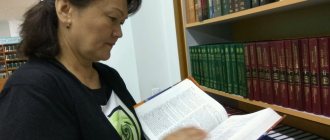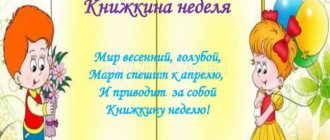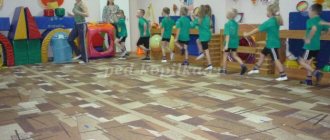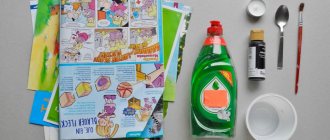Important aspects of the theory
The purposeful process of becoming familiar with methodological theories and their practical use in working with young kindergarten students is called self-education of a preschool teacher.
A good teacher is a seeking teacher. And he is looking, first of all, for answers to questions that cause difficulties in his professional activities. This is the principle of choosing a topic for self-education defined by the Federal State Educational Standard. In addition, the rapidly changing modern world requires teachers to constantly develop themselves and take into account current educational trends.
We are depriving children of their future if we continue to teach today the same way we taught it yesterday.
D. Dewey
Goals
Among the factors determining the need for self-education for a teacher of the older group (children 5–6 years old), we can highlight:
- getting to know the experience of colleagues and mastering current pedagogical technologies (children of senior preschool age are no longer kindergarteners in the usual sense, they are future first-graders, which means the teacher must focus on elements of educational work related to preparing for school);
- systematization of the studied methods that allow optimizing work with children of the older group (despite the fact that the teacher has been engaged in self-education for several years, and in accordance with the recommendations of methodologists and the Federal State Educational Standard chooses topics that are close to each other, the volume of updated information is constantly growing, so the teacher has to keep up to date );
- creating conditions for the full physical, mental, mental and emotional development of the younger generation (this goal is unchanged for any form of work with children).
Self-education helps enrich a teacher’s methodological repertoire
Tasks
Achieving the goals is facilitated by solving the following tasks:
- regular monitoring of new methodological literature (in the Internet space this important task is solved without much effort - just make a request in a search engine);
- turning to classic examples of the theory and practice of working as a teacher of a senior group in a kindergarten (constant reference to the best examples of specialized literature will allow you to refresh your memory of some methodological points, as well as evaluate the rationality and productivity of using new methods and technologies);
- introducing elements of different pedagogical technologies into personal practice (of course, this is a key task of self-education - to diversify the forms of interaction between the teacher and the kids);
- attempts to generalize and disseminate the experience gained (truth is born in a dispute - this postulate is true for methodological work, which requires not only practical mastery, but also, especially considering the age of the wards, a comprehensive consideration and analysis of the theory together with colleagues).
Principles of self-education
For the self-learning process to be effective, the teacher must build work according to certain principles.
- Continuity. The development of one topic usually takes one academic year. However, in rare cases, when the topic chosen is broad, the work can last for 1.5–2 years (for example, if children had difficulties with speech development during their education in the middle group, then the topic on the speech development of older preschoolers will allow us to find optimal techniques for problem solving);
- Continuity. Each subsequent topic must be chosen so that it is related to the previous one and corresponds to the goals and objectives of the educational process in kindergarten. Therefore, the study “Fundamentals of Literacy” is an example of how the development of a topic is delayed for a longer period, because the relevance of the issue in the preparatory group will not be lost.
- Availability of translating theory into practice when working with a specific group. So, when working on the topic of computer technology in kindergarten, it makes no sense to use speed typing machines in classes with children - children, firstly, do not have such precise finger movements, and secondly, many of them do not know the letters well enough (a similar experiment has a greater chance of success next year, when students from the senior group move on to the preparatory group).
Whatever method of work is explored by the teacher, it must be understandable and accessible to children in practice.
Forms of work
For a comprehensive consideration of the topic of self-education, the teacher must take into account the fact that he will have to work in three directions:
- with kids;
- with colleagues;
- with parents.
At the same time, for each direction the teacher selects certain forms of work. Work with children is carried out in the form of:
- educational activities (in the form of games, preparation of performances, open lessons);
- on walks (at all stages - observation, work, play, individual work);
- fulfillment of routine moments (as a basis for the implementation of topics related to the culture of health).
The teacher interacts with colleagues in the form of:
- mutual visits to classes (for the purpose of exchanging experience and monitoring the success of implementing copyright developments within the framework of self-education into practical activities);
- speeches at pedagogical councils;
- participation in meetings of the methodological association of kindergarten teachers (in the form of preparing presentations, reports, etc.);
- publications in specialized periodicals and on websites dedicated to methodological work in kindergarten, maintaining an author’s blog;
- attending professional development courses;
- participation in professional skills competitions and reflection on their results (in the form of publications or speeches).
Work with parents is organized in the following ways:
- consultations on current topics (for example, as part of the consideration of the topic “Development of forms of communication in preschoolers,” the teacher needs to find out how communication occurs in the family and, if there are problems, then consultations and other forms of work with parents cannot be avoided);
- round tables (this discussion form of work allows you to present intermediate results of the work - discussion of children’s creative projects, progress in the development of skills, abilities, and its results, and for example, when considering the topic “Creating psychological comfort in a preschool group”, also highlighting problematic issues, faced by participants in the educational process of this group);
Round tables, like other forms of group communication with parents, make it possible to identify a range of problematic issues related to the learning, development and upbringing of children
- parent meetings (children’s successes are discussed, as well as problematic issues);
- pedagogical trainings (for example, when working on the topic “Educating Honesty and Truthfulness in Preschool Children,” the teacher invites mothers and fathers to name a number of situations when their 5-6 year old children lied; for further consideration of the issue, the teacher records these situations, and offers parents “universal” ones ways to combat lies, for example, shaming the child on behalf of his favorite toy, using fairy tale therapy, etc.).
From the above we can conclude that the topic of professional and personal self-improvement is discussed in two formats:
- individual (when the teacher organizes work with the children of his group, attends classes of colleagues, prepares parent meetings);
- group (summarizing and sharing experience together with colleagues, for example, creating original educational programs, discussing the problem with parents, teaching staff).
Setting goals
Among the factors that determine the importance of self-education for educators of 5-6 year old children are:
- studying the experience of colleagues, mastering innovative pedagogical technologies;
- systematization of the studied methods that allow us to systematize work with children of the older group;
- creating conditions for normal mental, mental, physical, emotional development of pupils.
Topics for self-education for senior group educators
The topics of the questions recommended by the Federal State Educational Standard are common to teachers working with children of different ages. But at the same time, the teacher of the senior group considers them in terms of relevance for working with children aged 5–6 years. In particular, these are topics related to the development of prerequisites for educational activities (development of writing, reading and elementary literary text analysis skills). When choosing topics related to the education of moral qualities (kindness, responsiveness, honesty and decency), the teacher needs to keep in mind that older children, unlike children of the second youngest, middle groups, do not simply copy the behavior and attitudes of adults, but colorize these characteristics from your own experience, your own ideas.
This is interesting. Blocks of questions related to the practical development of health-saving technologies and the formation of safe life skills will always be relevant.
- Methods and means of amplifying the development (increasing the number of skills developed) of a preschooler.
- Pedagogical diagnostics in a preschool institution.
- Individual approach to working with senior group students.
- Means and methods of developing safe life skills in older preschoolers (for example, learning traffic rules).
- Development of emotional intelligence in preschoolers.
- Guiding the play activities of senior group pupils.
- Cultivating kindness in older preschoolers.
- Raising responsiveness in children of senior preschool age.
- Cultivating sense of purpose in preschool children.
- Cultivating honesty and truthfulness in older preschoolers.
- Formation of ideas about the small homeland among older preschoolers.
- Development of creative abilities in children of the older age group.
- Formation of prerequisites for educational activities in children of senior preschool age.
- Cultivating curiosity in preschoolers (in classes, in communication, play, work).
- Formation in children of the older group of ideas about the signs, qualities and properties of objects in the surrounding world.
- Familiarization of older preschoolers with the biocenosis of the forest (meadows, ponds).
- Formation of ideas about space among older preschoolers.
- Formation of ideas about inanimate nature in children of senior preschool age (natural phenomena, seasons, change of day and night).
- Formation of ideas about the shape, size, spatial relationships of objects among students of the senior group.
- Formation of the concept of number in older preschoolers.
- Development of forms of communication in older preschoolers.
- Development of coherent speech in children of senior preschool age (in communication, play).
- Teaching children 5–6 years old basic analysis of a literary work.
- Teaching senior group students the retelling of literary works.
- Teaching senior group students to expressively read poems.
- Creative storytelling in kindergarten.
- Literacy training in preschool educational institutions.
- Non-traditional techniques of visual activity in kindergarten.
- Health-saving technologies in preschool education.
- Formation of cultural and hygienic skills in children of senior preschool age.
- Formation of self-service skills in preschoolers.
- Creating psychological comfort in the senior group of preschool educational institutions.
- Computer technologies in preschool education.
- Continuity of preschool and primary education.
- Psychological and pedagogical assistance to families in the upbringing and development of preschool children.
In 2016, a question related to working with children with disabilities was added to the list of recommended topics for the Federal State Educational Standard: “Inclusive education in preschool settings.” Since many kindergartens support the state initiative regarding the inclusion of children with disabilities in the educational process of regular preschool institutions, a teacher who is faced with the fact that there is such a child in his group will be interested and useful to consider this topic. The wording can be slightly adjusted at a meeting of the methodological council of the teaching staff to make the topic narrower, for example, “Game activities in the aspect of inclusive education in preschool educational institutions” or “Forms of working with parents within the framework of inclusive education in preschool educational institutions.” The last example is especially relevant, since not all families accept the fact that children with disabilities have the same rights to learning, development, education and communication as healthy children.
There are also a number of topics that relate to the specifics of working in a kindergarten in general, that is, regardless of the age of the wards:
- Planning work in a preschool institution according to the Federal State Educational Standard.
- Developing subject-spatial environment in preschool educational institutions.
- Development of partial preschool education programs.
- Innovative forms of working with parents of preschool children.
- Variability of preschool education services at the present stage.
- Experimental activities in preschool educational institutions.
- Quality of preschool education: evaluation criteria.
- Social relations in preschool education.
Typically, such topics are chosen by more experienced teachers who, from their rich experience, have found answers to all the working questions that arise in the group. In other words, the educator has something to share in terms of methodology: the time has come to systematize his work in the aspect of transferring experience to young colleagues, that is, mentoring.





